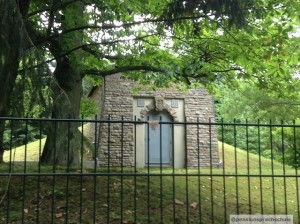When we still got letters by regular post, friends sometimes commented on the beautiful street name: Im Rosengärtchen (lit: In the Little Rose Garden).
If they did come for a visit, they were a bit surprised to see this high-rise settlement. Well, we do have some roses climbing up on the side of our building.

I started asking around who might have been in charge to name a big part of this area ‘Im Rosengärtchen’.
Our local historian, Manfred Kopp, had the answer:
In the 16th century, the ‘register of arable land’ had named this area ‘In the Rose Garden’.
In 1972 (at the time of construction), the diminutive form was added, hence ‘In the Little Rose Garden’.




